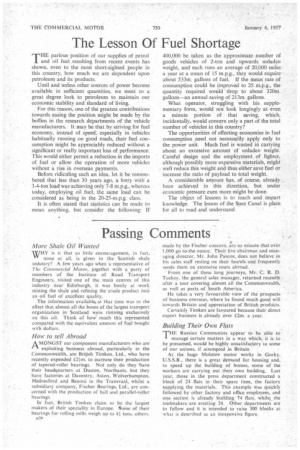The Lesson Of Fuel Shortage
Page 36

If you've noticed an error in this article please click here to report it so we can fix it.
THE parlous position of our supplies of petrol and oil fuel resulting from recent events has shown, even to the most short-sighted people in this country, how much we are dependent upon petroleum and its products.
Until and unless other sources of power become available in sufficient quantities, we must to a great degree look to petroleum to maintain our economic stability and standard of living.
For this reason, one of the greatest contributions towards easing the position might be made by the boffins in the research departments of the vehicle manufacturers. It may be that by striving for fuel economy, instead of speed, especially in vehicles habitually running on good roads, their fuel consumption might be appreciably reduced without a significant or really important loss of performance. This would either permit a reduction in the imports of fuel or allow the operation of more vehicles without a rise in overseas payments.
Before ridiculing such an idea, let it be remembered that less than 30 years ago, a lorry with a 3-4-ton load was.achieving only 7-8 m.p.g., whereas today, employing oil fuel, the same load can be considered as being in the 20-25-m.p.g. class.
It is often stated that statistics can be made to mean anything, but consider the following: If 400,000 be taken as the approximate number of goods vehicles of 2-ton and upwards unladen weight, and each runs an average of 20,000 miles a year at a mean of 15 m.p.g., they would require' about 533m gallons of fuel. If the mean rate of consumption could be improved to 25 m.p.g., the quantity required would drop to about 320m. gallons—an annual saving of 213m. gallons.
What operator, struggling with his, supplementary form,. would not look longingly at even a minute portion of that saving, which, incidentally, would concern only a part of the total number of vehicles in this country?
The opportunities of effecting economies in fuel consumption need not necessarily apply only to the power unit. Much fuel is wasted in carrying about an excessive amount of unladen weight. Careful design and the employment of lighter, although possibly more expensive materials, might well reduce this weight and thus either save fuel or increase the ratio of payload to total weight.
A considerable amount has, of course, already been achieved in this direction, but under economic pressure even more might be done.
The object of lessons is to teach and impart knowledge. The lesson of the Suez Canal is plain for all to read and understand.








































































































